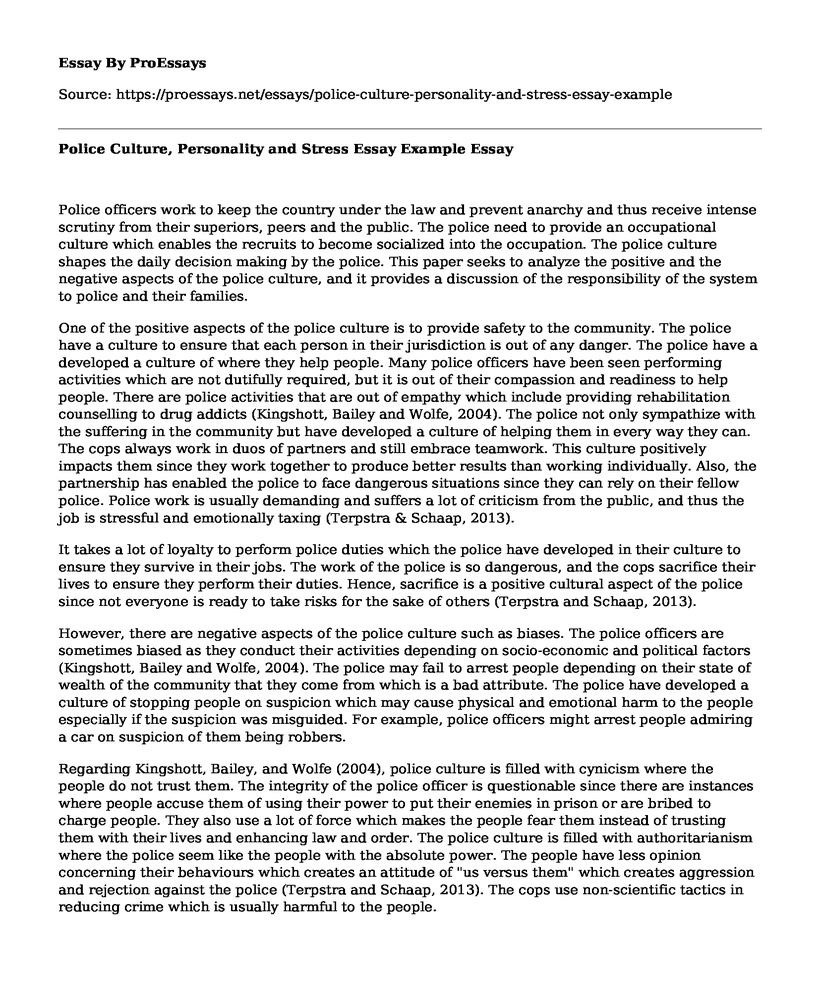Police officers work to keep the country under the law and prevent anarchy and thus receive intense scrutiny from their superiors, peers and the public. The police need to provide an occupational culture which enables the recruits to become socialized into the occupation. The police culture shapes the daily decision making by the police. This paper seeks to analyze the positive and the negative aspects of the police culture, and it provides a discussion of the responsibility of the system to police and their families.
One of the positive aspects of the police culture is to provide safety to the community. The police have a culture to ensure that each person in their jurisdiction is out of any danger. The police have a developed a culture of where they help people. Many police officers have been seen performing activities which are not dutifully required, but it is out of their compassion and readiness to help people. There are police activities that are out of empathy which include providing rehabilitation counselling to drug addicts (Kingshott, Bailey and Wolfe, 2004). The police not only sympathize with the suffering in the community but have developed a culture of helping them in every way they can. The cops always work in duos of partners and still embrace teamwork. This culture positively impacts them since they work together to produce better results than working individually. Also, the partnership has enabled the police to face dangerous situations since they can rely on their fellow police. Police work is usually demanding and suffers a lot of criticism from the public, and thus the job is stressful and emotionally taxing (Terpstra & Schaap, 2013).
It takes a lot of loyalty to perform police duties which the police have developed in their culture to ensure they survive in their jobs. The work of the police is so dangerous, and the cops sacrifice their lives to ensure they perform their duties. Hence, sacrifice is a positive cultural aspect of the police since not everyone is ready to take risks for the sake of others (Terpstra and Schaap, 2013).
However, there are negative aspects of the police culture such as biases. The police officers are sometimes biased as they conduct their activities depending on socio-economic and political factors (Kingshott, Bailey and Wolfe, 2004). The police may fail to arrest people depending on their state of wealth of the community that they come from which is a bad attribute. The police have developed a culture of stopping people on suspicion which may cause physical and emotional harm to the people especially if the suspicion was misguided. For example, police officers might arrest people admiring a car on suspicion of them being robbers.
Regarding Kingshott, Bailey, and Wolfe (2004), police culture is filled with cynicism where the people do not trust them. The integrity of the police officer is questionable since there are instances where people accuse them of using their power to put their enemies in prison or are bribed to charge people. They also use a lot of force which makes the people fear them instead of trusting them with their lives and enhancing law and order. The police culture is filled with authoritarianism where the police seem like the people with the absolute power. The people have less opinion concerning their behaviours which creates an attitude of "us versus them" which creates aggression and rejection against the police (Terpstra and Schaap, 2013). The cops use non-scientific tactics in reducing crime which is usually harmful to the people.
The system has a responsibility to the police and their families. The police sacrifice in their duties which include their life and therefore the system has the responsibility of compensating those regarding cash (Cordner, 2016). When police die in the line of duty, the system has the burden of providing financial support to their families especially when he/she was the breadwinner for the home. According to Cordner (2016), police encounters emotionally stressing events such as accidents and incidents concerning deaths, and thus it is the responsibility of the system to ensure that they provide the police with the necessary counselling and guidance. The advice is meant to make sure that the cops are emotionally stable. Also, it is the responsibility of the society to provide corporation and support to the police and realize that they are as human as everyone else. It is clear that the work of police officers is to maintain peace and harmony in the society. They are advised to provide occupational culture to the recruits and thus creating a social workplace. This type of culture leads to better decision making.
References
Cordner, G. W. (2016). Police administration. Routledge.Kingshott, B. F., Bailey, K., & Wolfe, S. E. (2004). Police culture, ethics, and entitlement theory. Criminal Justice Studies, 17(2), 187-202.
Terpstra, J., & Schaap, D. (2013). Police culture, stress conditions, and working styles. European Journal of Criminology, 10(1), 59-73.
Cite this page
Police Culture, Personality and Stress Essay Example. (2022, Jul 08). Retrieved from https://proessays.net/essays/police-culture-personality-and-stress-essay-example
If you are the original author of this essay and no longer wish to have it published on the ProEssays website, please click below to request its removal:
- Yayoi Kusama's Artwork & Mental Illness: An Exploration - Essay Sample
- U.S. Population in 2030: Rising Older Generation Challenges Demographics - Essay Sample
- Essay Example on the Impact of Technology on Human Cognition
- Essay Sample on Modern Theorists: Prahalad & Mintzberg's Focus on Human Interactions
- Exploring the Role of Behavioral Finance in Investment Decisions - Free Paper Example
- Developing Employability Skills: A Self-Assessment for the Role of Voluntary Witness Support Worker
- Shadow Experience - Essay Sample







